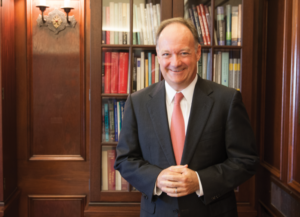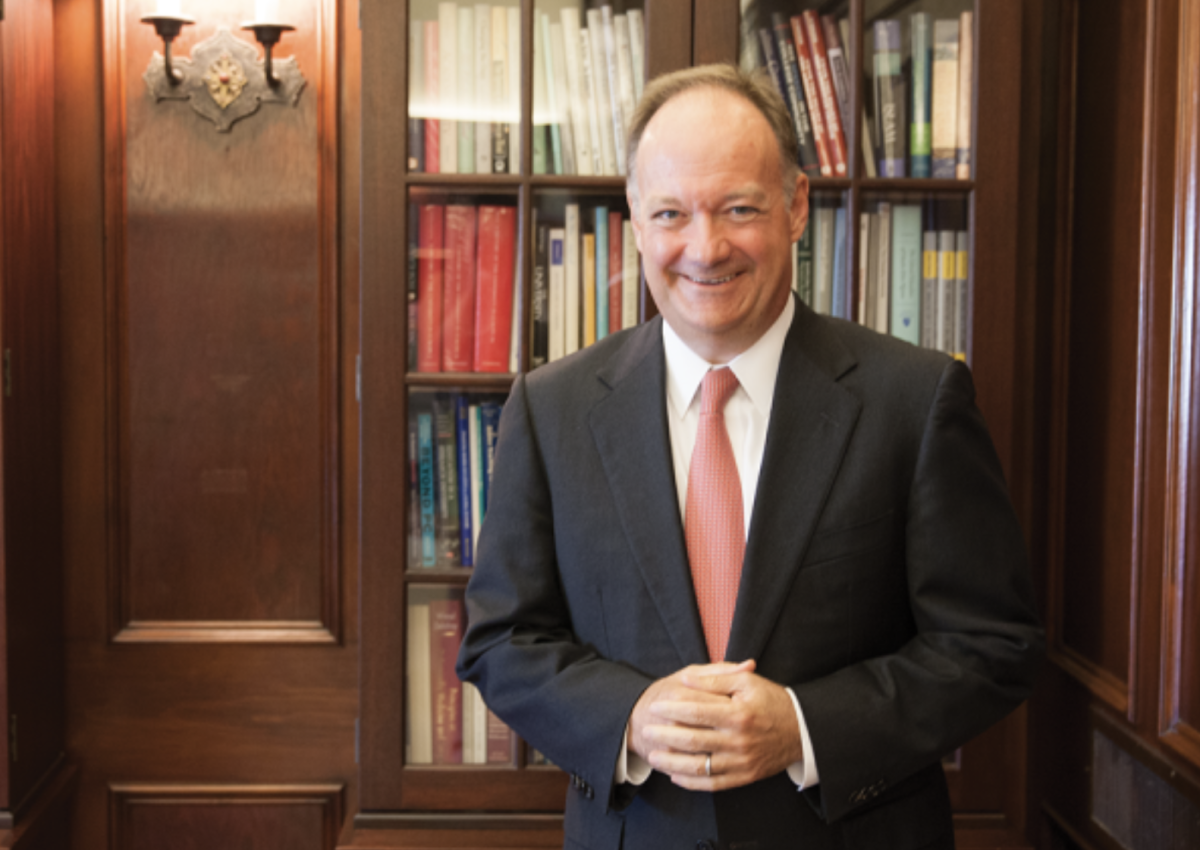This story was updated April 5 to reflect ongoing developments.
CW: This article discusses violence and death in Israel and Gaza. Please refer to the end of the article for on- and off-campus resources.
Georgetown University President John J. DeGioia (CAS ’79, GRD ’95) commemorated various religious holidays with a call for access to humanitarian aid in the Middle East, the return of hostages and an immediate ceasefire in Gaza in an April 1 email to the Georgetown community.
DeGioia said his call for a humanitarian response comes especially as Christians, Muslims, Jews and Hindus reflect during a sacred time in their faiths. Joining university presidents from the University of Notre Dame and Wesleyan University, DeGioia is among an early group of academic administrators calling for a ceasefire.
DeGioia said there must be further action in addition to the initial steps of securing safety and resources for Palestinians and releasing hostages.
“In the Middle East, it begins with access to humanitarian aid, the return of the hostages, and an immediate ceasefire in Gaza,” DeGioia wrote in the email. “And we must recognize that so much more will be required if we can support the choices of ‘life…reconciliation…justice…relationship…dialogue.’”

Calls for a ceasefire and the release of Israeli hostages have been part of global diplomatic discourse and action, with the United Nations Security Council passing a March 25 resolution calling for a pause in fighting throughout Ramadan coupled with the release of hostages.
Akanksha Sinha (SFS ’23), a staff member at the Center for Social Justice and an organizer with Faculty and Staff for Justice in Palestine (FSJP), said though DeGioia’s call for a ceasefire has reassured them, they feel it should have come sooner.
“I am happy to see President DeGioia join other University presidents as the first few to call for a ceasefire,” Sinha wrote to The Hoya.
“At the same time, I do grieve the fact that it has taken upwards of 40,000 deaths and nearly 100,000 injured to have this call for a ceasefire issued,” they added.
The Israeli military response to the Oct. 7 Hamas terrorist attacks has killed nearly 33,000 Palestinians and resulted in widespread food shortages and limited access to humanitarian aid in the Gaza Strip.
Ava Uditsky (CAS ’25) said she supports both humanitarian assistance in Gaza and an immediate hostage release, which she feels is a moral imperative because of the imminent threats facing those held by Hamas.
“It’s heartbreaking to watch the parents of people our age — hostages like Hersh Goldberg-Polin or Noa Argamani — pleading for their children to come home but uncertain that they’re even still alive,” Uditsky wrote to The Hoya.
Hamas took captive over 250 hostages on Oct. 7, and over 100 have since been returned to Israel while nearly 130 remain in captivity. Thirty-three are confirmed to have died, while the status of many remains unknown.
Uditsky said DeGioia’s call for the release of hostages simply reflects the proper humanitarian response to the crisis rather than a commendable call to action.
“There is a clear right, human answer to this situation, which is that the hostages must be released immediately and unconditionally,” Uditsky wrote. “It’s not a bold or courageous or surprising statement for Pres. DeGioia to make — it’s the bare minimum.”
“This is not to say that the deaths in Gaza aren’t devastating and innocent civilians there don’t deserve safety and protection but these two things can be true at the same time,” she added.
Mark Lance, an organizer with FSJP and a professor of philosophy at Georgetown, said the university must stop its investments in companies that produce weapons for the Israeli military to truly follow through in their call for peace.
“Just as the US cannot coherently call for ceasefire and simultaneously supply weapons to violate it, Georgetown must not call for justice and invest in corporations that are complicit in its opposite,” Lance wrote to The Hoya. “We must divest now and call for systematic sanctions on Israel.”
Pro-Palestine activists on campus have previously called for Georgetown to curb its investments in companies with financial ties to the Israeli military, including Amazon and Alphabet, Inc., which is Google’s parent company.
Sinha said they hope that the university takes a more proactive stance against hosting members of the Israeli military on campus.
“It is a shame that in the last two months, we have seen 4 members of the Israeli military, some who had just come from Gaza, welcomed on to our Main Campus and our Law Campus,” Sinha wrote. “I hope such events are strongly discouraged in the future.”
Over the past six weeks, four soldiers from the Israel Defense Forces (IDF) have spoken in two separate events at Georgetown’s main campus and at the Georgetown University Law Center, both of which sparked protests.
DeGioia’s email included quotes from the writings of Catholic religious leaders — including Pope Francis and Fr. Arturo Sosa, S.J. — about the dire state of Gaza, where millions are on the brink of famine.
DeGioia said he recognizes the personal impact of the Israel-Hamas war on members of the university community.
“For a Georgetown community built on a belief in the mutually reinforcing encounter across faiths, this is a season of hope, of possibilities,” DeGioia wrote. “And it is a moment in which so many in our world are suffering — suffering that is felt deeply, here, in our Georgetown community.”
Resources: On-campus resources include Health Education Services (202-687-8949) and Counseling and Psychiatric Service (202-687-7080); off-campus resources include Crisis Text Line (text 741741).






















